Photo: Monhand Mathurin
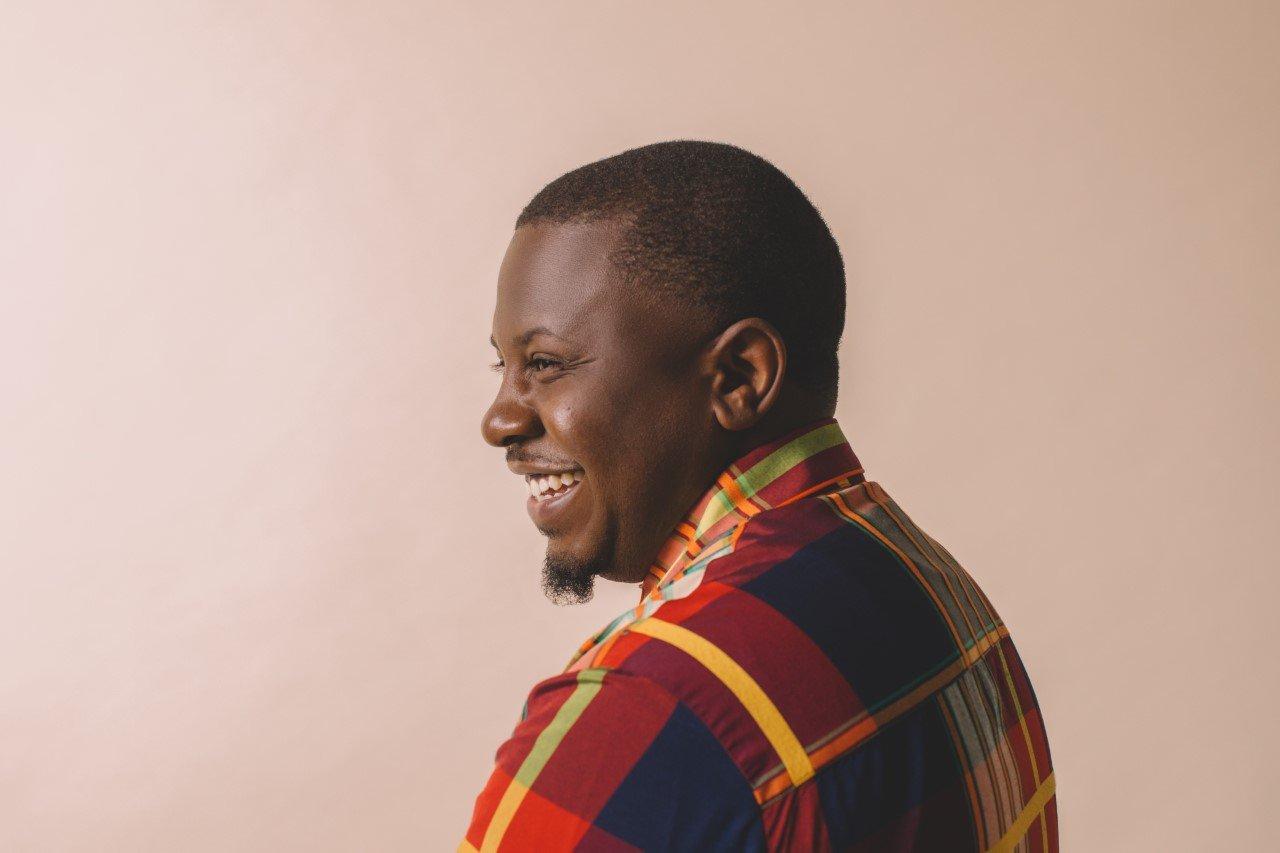
interview
5 Essential D'Mile Productions: Silk Sonic, Victoria Monét, & Others
Producer Of The Year, Non-Classical GRAMMY nominee D’Mile revisits his career milestones and discusses his work with H.E.R. Victoria Monét, Silk Sonic and more.
Editor’s note: This article has been updated on Monday, Jan. 22 to include mention of Victoria Monét and reflect D’Mile’s 2024 GRAMMY nomination.
"He is a genius. I don’t feel like most people realize how much of a genius he actually is" producer D’Mile asserts when thinking back on his popular project with Bruno Mars.
But prior to the formation of Silk Sonic, longtime friend and bandmate Anderson .Paak implored Mars and D’Mile to come together for a session. "Once we realized we were doing a group project, I think it was easy for all of us to know what kind of vibe it was going to be," D'Mile says.
"Leave The Door Open,'' the GRAMMY-winning product of the trio’s collaboration, became a hit for its groovy R&B bridges and velvety vocal harmonies — and D’Mile’s career skyrocketed. Now, he is a creative backbone behind many top artists, infusing discographies with blues, jazz and neo-R&B, while engineering for Beyoncé, Jay Z, Lupe Fiasco, H.E.R. and others. Now, D’Mile is nominated for Producer Of The Year, Non-Classical, at the 2024 GRAMMYs, alongside Jack Antonoff, Hit-Boy and more.
At the66th GRAMMY Awards, D’Mile is nominated forProducer Of The Year, Non-Classical for his work on JAGUAR II. TheVictoria Monét record is nominated for Best R&B Album and Best Engineered Album. Non-Classical.
Long before earning a clutch of awards, D’Mile was disciplined in a musical household. Dernst Emile II, a.k.a. D'Mile was born to two esteemed Haitian musicians — vocalist Yanick Étienne and Dernst Emile, an established music arranger and instrumentalist — with a wide global lineage and appreciation of the music of the African diaspora. Coming up in Brooklyn, D'Mile learned the piano from his father, and would hear his mother sing jazz and Haitian konpa around the house.
"They would always work together," the music producer bashfully remembers over Zoom, chuckling. "My dad [still] gives private lessons to this day. I was just always around instruments my whole life — the jam and recording sessions. I feel like I am just a younger version of him."
A young D'Mile inherited the musical aptitude of his parents, nurturing his musical roots while keeping his ear close to the ground as his career blossomed. "One of my first [producer] placements ever was actually Mary J. Blige in 2005," D’Mile reflects bashfully. That single was the title track on Blige’s 2005 album, The Breakthrough, which won the GRAMMY Award for Best R&B Record.
Nearly two decades into producing music, D’Mile applies artists' personal experiences to the music they create together, tailoring their sounds as a reflection of who they are, at the moment he meets them. "I just do what I know when I feel right in my heart," D’Mile says, shrugging his shoulders. "[But] when I do a collab with an artist, I try to speak to who they are through the music."
That insight, and ability to cohere an artist's essence with contemporary culture, has led to many hit-making moments. After having compulsive thoughts of quitting music over the past decade, D’Mile ignited an artistic flare at the beginning of the pandemic and a plethora of gold-plated accolades was on the horizon.
From 2020 to 2022, D’Mile experienced highs that accelerated career’s trajectory. At the 2020 GRAMMY Awards, D’Mile received seven nominations for his work on Lucky Daye’s debut album, Painted and H.E.R’s second album, I Used To Know Her. Following the police murder of George Floyd, D'Mile channeled racial tensions into H.E.R.'s "I Can’t Breathe"; the song won the coveted GRAMMY Award for Song Of The Year in 2021. That same year, D'Mile won an Academy Award for Best Original Song ("Fight For You") in the motion picture, Judas and the Black Messiah.
D'Mile's star only continued to rise in 2022. At the 64th GRAMMY Awards, the producer took home three golden gramophones for his work on Silk Sonic's "Leave the Door Open" — including Song and Record Of The Year. A testament to his production expertise and wide-ranging ear, D'Mile was also nominated for his efforts on Christian/Contemporary song "Hold Us Together (Hope Mix)."
"I am not saying my first accomplishments haven’t hit me yet, but it is just unbelievable sometimes to think of all of the good things that have been happening in my career recently," D'Mile reflects.
At the 66th GRAMMY Awards, D’Mile is nominated for his work on JAGUAR II; the Victoria Monét record is nominated for Best R&B Album and Best Engineered Album. Non-Classical.
The Los Angeles-based musician is nourishing the nucleic basis of R&B, creating an environment for upcoming and celebrated artists to rejoice and evolve. The producer shared memories from some of his favorite collaborations with GRAMMY.com.
Joyce Wrice - Overgrown
Executive produced by D’Mile, Joyce Wrice's 2021 debut album is an exquisite gift to R&B buffs. The bluesy 14-track Overgrown is a delineation of nostalgic 90’s R&B and hip-hop, with pitched vocal highs and emotional lows.
"The first time Joyce and I met in the studio, I was picking up on who she is as a woman and her vision for Overgrown," says D’Mile. "I got close with her and I would gather information off of what she would play me. I feel like when I make music, that's me kind of examining who you are."
Throughout Overgrown, the San Diego native sings about the pains of healing from heartbreak and unrequited love. The album is also a celebration of womanhood, where a confidently independent Wrice embraces the mental strength she discovered while finding herself.
Buddy - "Happy Hour"
Compton-raised rapper Buddy released his sophomore album, Superghetto, in 2022 and D’Mile produced one of the most popular tracks from the project. "Happy Hour" is an ode to letting loose and treating life as joyously chaotic as ordering a drink at a crowded bar on a weekend night.
"Buddy and I created this song a couple of years ago," D’Mile recalls, thinking deeply about the track's origins.
The single can be seen as a sequel to T-Pain’s 2007 anthem, "Bartender" — and fittingly so. Adds D'Mile, "T-Pain hopped on the track maybe a few months before it was released. I can’t take credit for getting that feature on the song, but it did make all the sense in the world."
H.E.R’s "Fight For You," "I Can’t Breathe" & I Used To Know Her
In 2021, D’Mile got together with longtime collaborators H.E.R and singerTiara Thomas to create socially-charged songs that highlighted the atrocities of police violence against Black Americans.
"The creation of these songs started with a conversation," D’Mile says, smiling as he reflects on the trio's tight bond. "H.E.R and Tiara were talking about what was going on in the world. H.E.R. is an artist that really cares about people and cares about what's right."
D'Mile recalls that H.E.R. picked up a guitar and played "I Can’t Breathe." "I remember tearing up when I first heard the song and I just knew exactly what I needed to do to help."
The producer also assisted on the tearful tune "Could've Been," which was also born from this session and later appeared on H.E.R’s second LP.
Victoria Monét - Jaguar
D’Mile had his hands in all processes behind the production of Victoria Monét’s debut album, Jaguar. The supersonic 2020 project is a funky unification of fun R&B with sultry pop melodies.
While Monét has penned lyrics for Ariana Grande, Nas, Chris Brown and others, Jaguar was the Georgia native's first full-length foray as a solo artist. The performer, dancer and recent mom is also using D’Mile’s musical compositions on her next album.
D'Mile says he's excited for Monét’s next musical chapter, which incorporates her experiences with motherhood and more sass.
"We dug a little deeper. She is an artist that I feel really comfortable with," the producer says of Monét's forthcoming record. "There might be a couple of songs that you wouldn’t expect from her, and then there are songs that are just incredible records."
And all in all? “That’s my fam. That’s like my sister, you know. Me and Vicky have known each other for years,” he said in another interview. “I’ve always been a fan. I’ve seen her grow and we’ve worked on and off pretty much since the beginning.”
Silk Sonic - An Evening With Silk Sonic
The breakout group of 2021 were undoubtedly the nostalgically catchy vocal duo Silk Sonic — a project of Bruno Mars and Anderson .Paak. D’Mile executive produced the entire An Evening With Silk Sonic album, which swept the 64th GRAMMY Awards.
D’Mile related immensely to Bruno Mars, who is also a producer, and found commonality in .Paak's interest in older R&B originals from the likes of Michael Jackson, Donny Hathaway and Stevie Wonder. The stars finally aligned in 2020 when Anderson reached out to D'Mile about a collaboration.
"It took us two years to create the vision and we all just kind of love that era of music [that Silk Sonic is emulating]. That's what we grew up on," D’Mile reminisces. "'Smoking Out the Window' was a song that Bruno and Anderson sat on for five years until the right moment came. It feels like a blur because we were just having so much fun together."
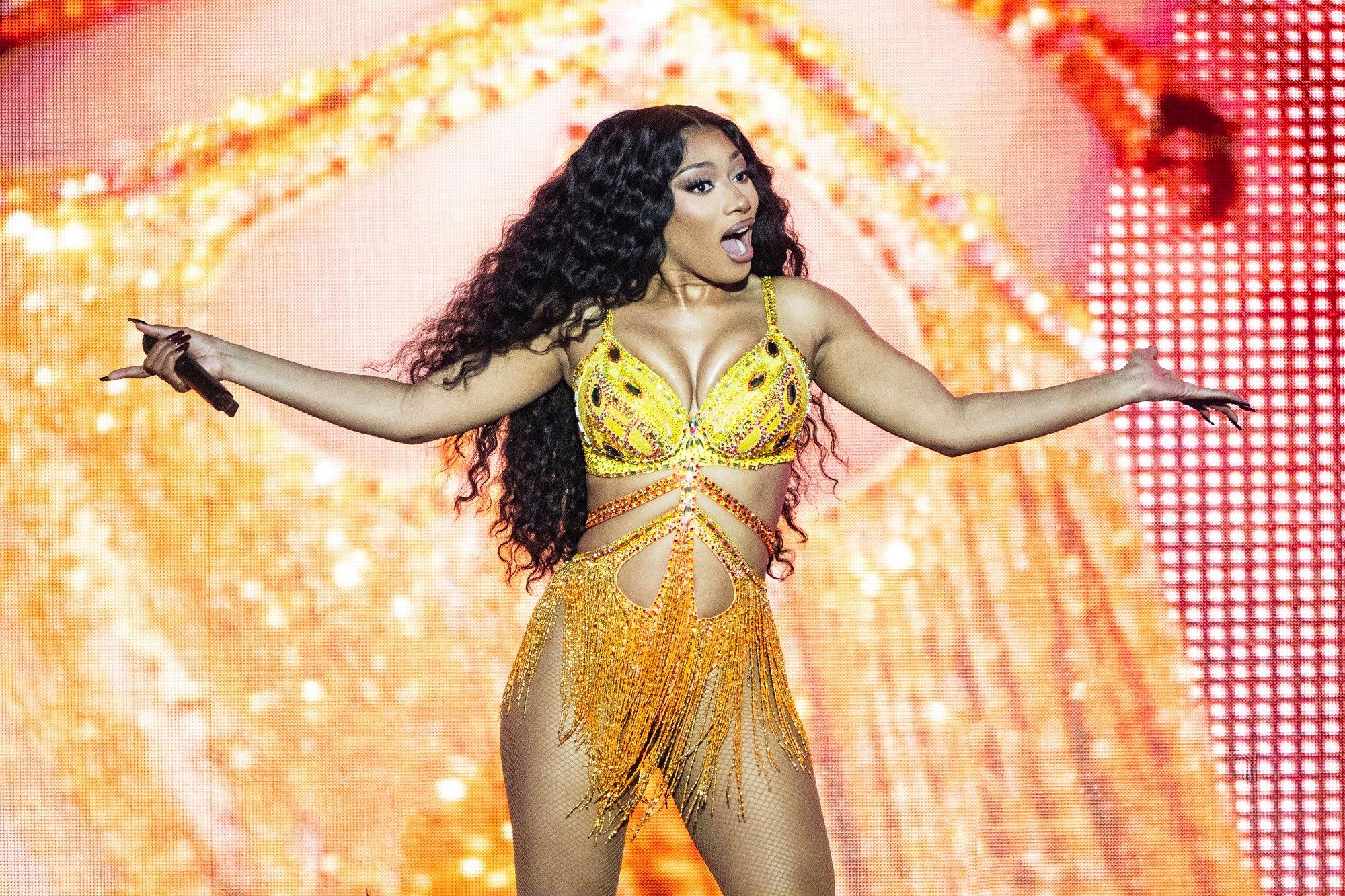
Photo: Erika Goldring/Getty Images
list
6 Takeaways From Megan Thee Stallion's 'Megan': Snakes, Shots & Self-Assurance
From the serpentine theme to Japanese rhyme schemes, Megan Thee Stallion's third album snatches back her own narrative and isn't afraid to take a bite.
Beware of venom: Megan Thee Stallion is not biting her tongue on her new album, simply titled Megan.
The GRAMMY winner's first full-length release in two years is also the first to drop under her own control. Fans have been ready for this release even before the first single, "Cobra," came out in November. The second single, "Hiss," followed in January and brought the star her first No. 1 hit on the Billboard’s Hot 100 and Global 200 charts. These songs, as well as the third single, "BOA," foreshadowed a certain slithery theme that helped shape the album.
Megan was released on June 28 and features guest stars such as GloRilla, Victoria Monét, Big K.R.I.T. and Kyle Richh as well as her longtime ace producers like Juicy J (who made "Hot Girl Summer" among other calling cards) and LilJuMadeDaBeat, who produced Stallion anthems like "Big Ole Freak," "Body" and "Thot S—."
Here’s what we learned from listening and vibing to the latest work by three-time GRAMMY winner Megan Thee Stallion.
A Theme Snakes Through Megan
As could have easily been predicted from the first three singles "Cobra," "Hiss" and "BOA," and now the album track "Rattle," there is a hint of a snake theme that wends its way through the album from beginning ("Hiss") to end ("Cobra").
In several songs, she denounces all the snake behavior that she has encountered from former lovers, friends, and haters who support those who have caused actual harm to her. In the music video for "Cobra," Megan literally sheds her old skin to reveal a shining new layer.
Megan Is Calling The Shots This Time
"I feel like Biggie, 'Who Shot Ya?’/But everybody know who shot me, bitch/ So now, let’s stop speaking on the topic," she rapped in "Who Me (feat. Pooh Shiesty)" off her 2022 album Traumazine. MTS was referencing the July 2020 incident in which rapper Tory Lanez shot her in the foot, and was subsequently charged with assault with a semiautomatic firearm and carrying a loaded, unregistered firearm in a vehicle.
Turns out, she wasn’t done referencing the topic. Now, she’s one taking the shots. MTS takes aim at less-talented women rappers on "Figueroa" (named for a Los Angeles street known for prostitution), and at Lanez on "Rattle," when she suggests that his male supporters should schedule a conjugal visit with him in prison. (Lanez is currently serving a 10-year sentence while simultaneously going through a divorce with wife Raina Chassagne.)
More Megan Thee Stallion News & Videos
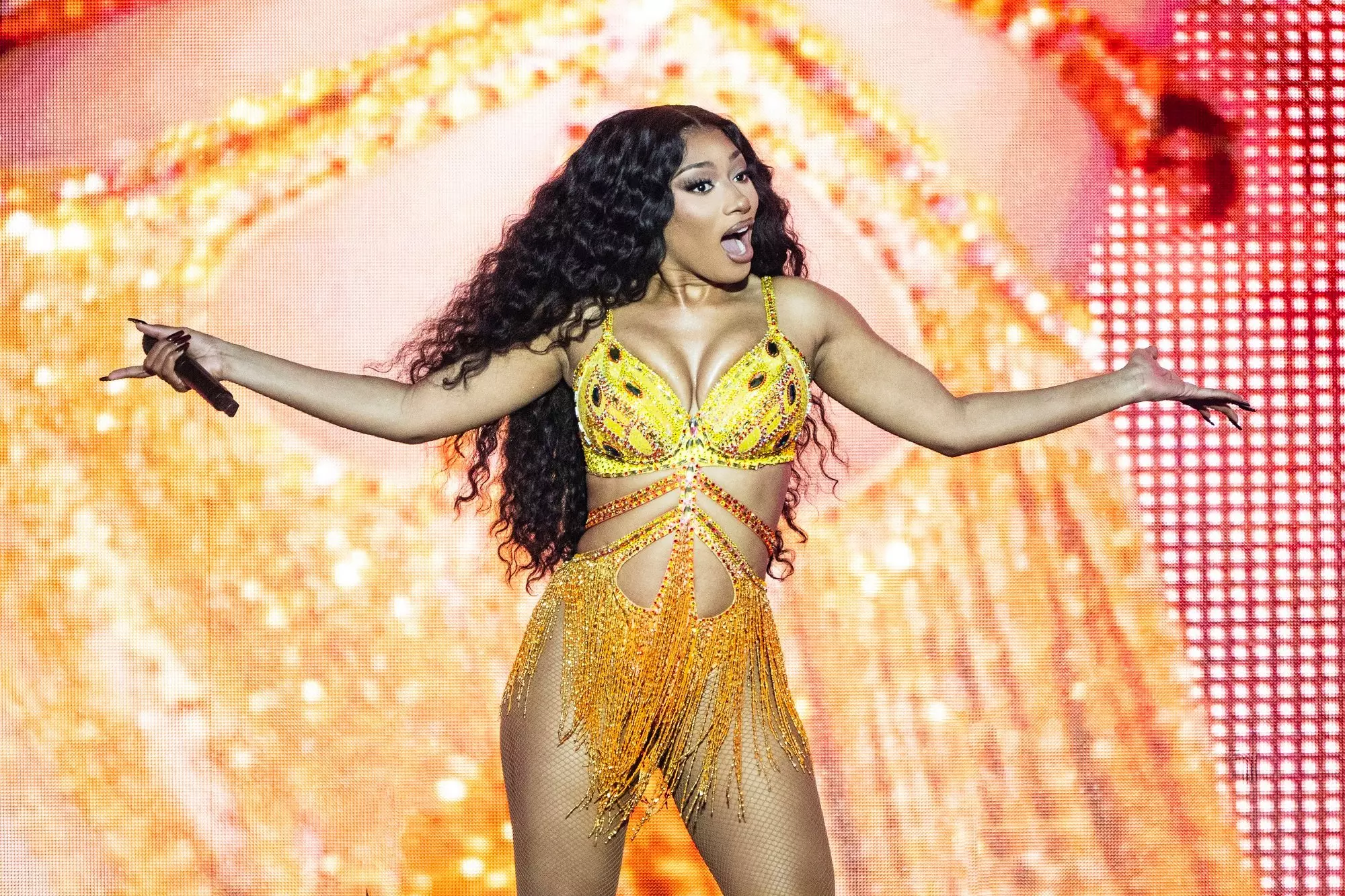
6 Takeaways From Megan Thee Stallion's 'Megan': Snakes, Shots & Self-Assurance
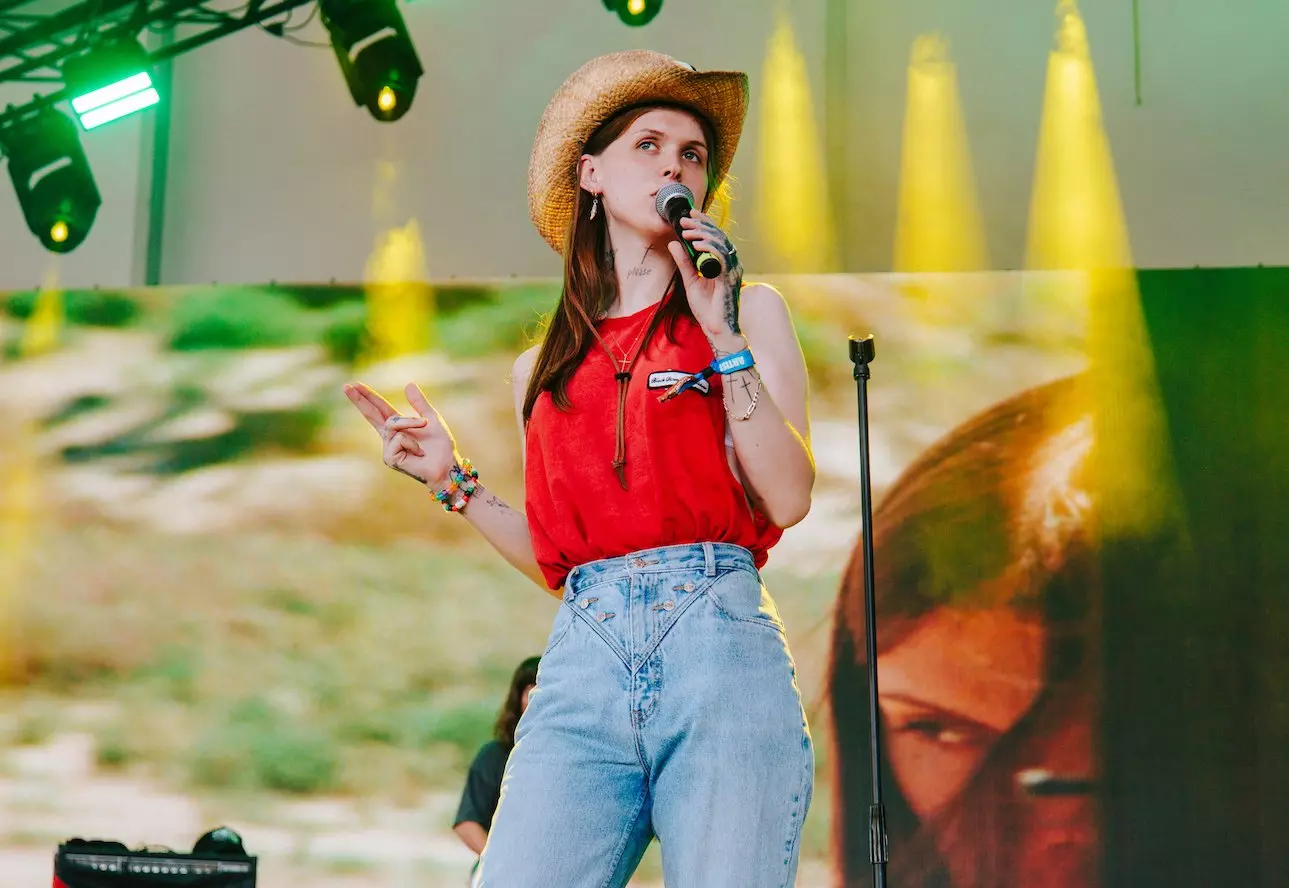
9 Epic Sets From Bonnaroo 2024: Ethel Cain, Melanie Martinez, Megan Thee Stallion & More
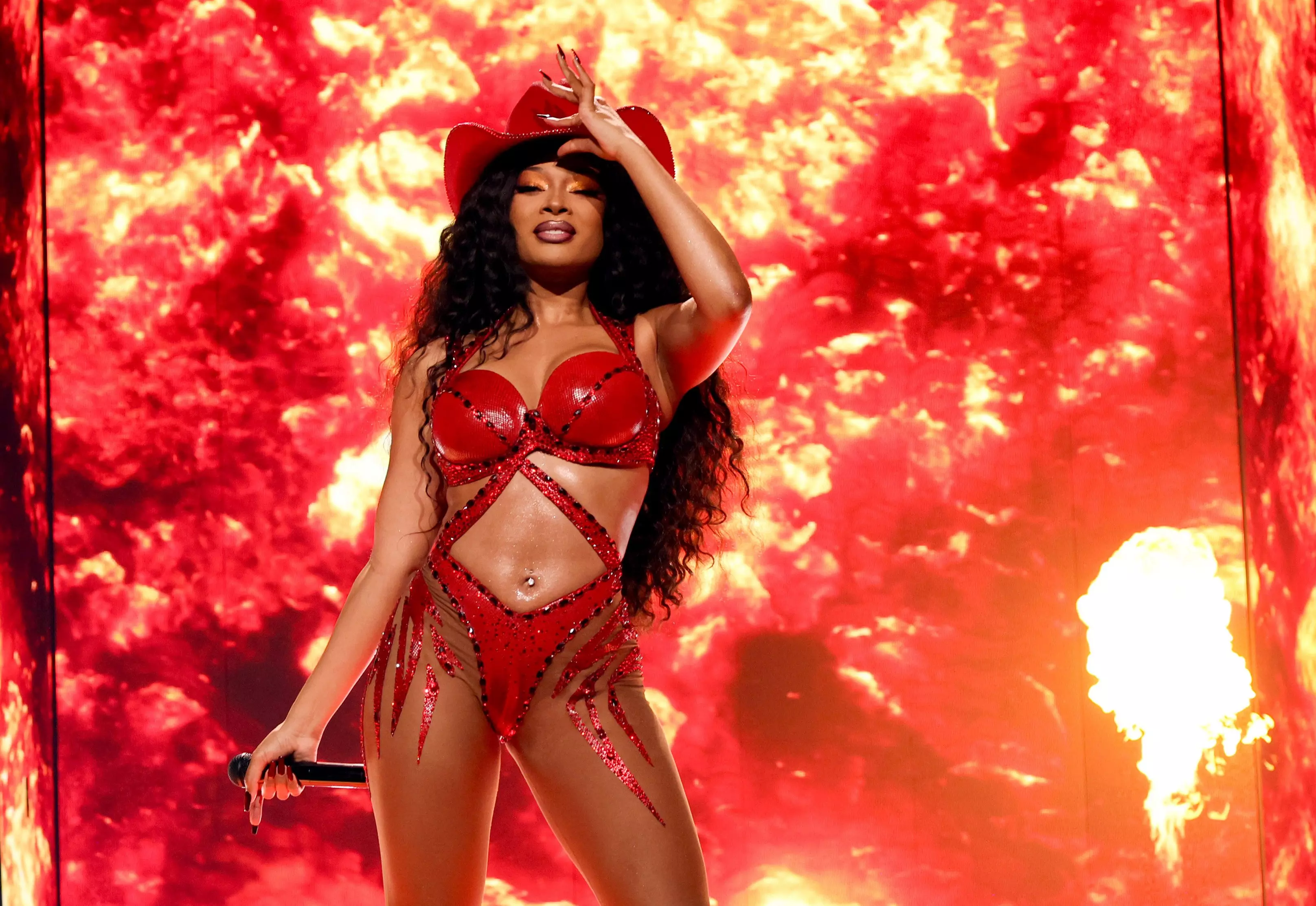
5 Iconic Moments From Megan Thee Stallion's Houston Hometown Shows
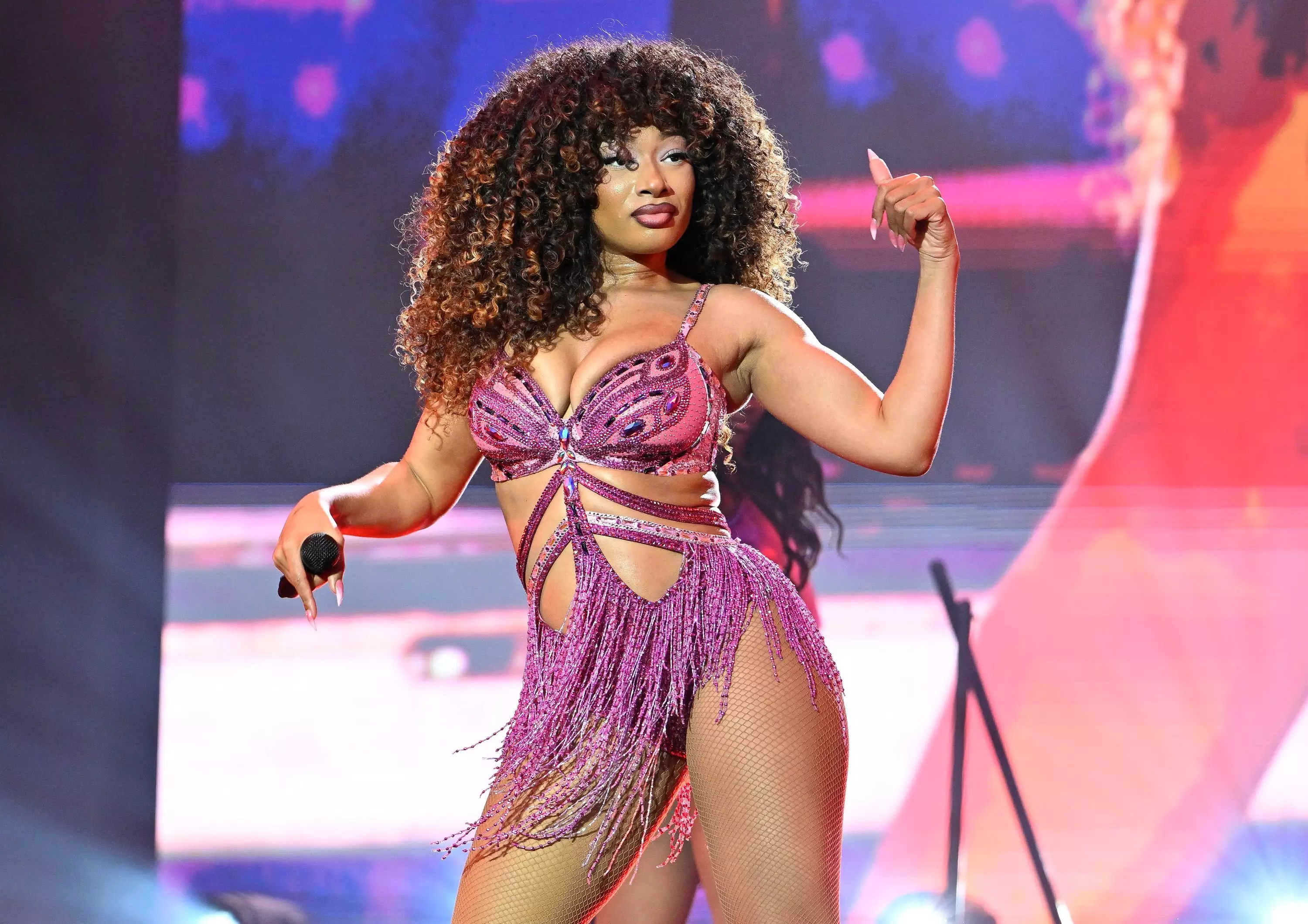
Everything We Know About Megan Thee Stallion's New Album 'Megan': Tracklist, Release Date & More
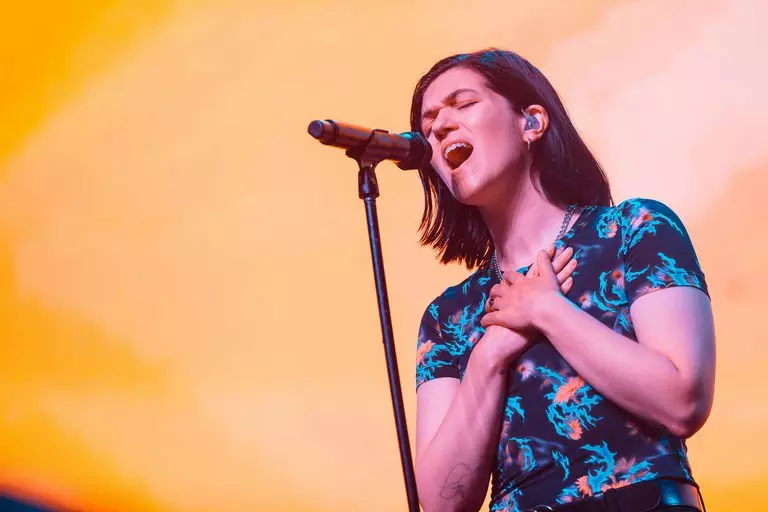
15 LGBTQIA+ Artists Performing At 2024 Summer Festivals
Inspiration Comes From Everywhere
The star and her collaborators incorporate unexpected musical influences on Megan via creative sampling. Megan Thee Stallion speeds up and flips Teena Marie's 1984 ballad "Out on a Limb" for "B.A.S." — a song she co-produced with her longtime ally LilJuMadeDaBeat. "BOA" is cleverly crafted from sounds in the first solo hit by Gwen Stefani, 2004’s "What You Waiting For?"
UGK are reunited from across the heavenly divide on the Juicy J-produced "Paper Together," with Bun B contributing new work and the late Pimp C joining in lyrical spirit. This is especially significant when considering that Juicy J produced "Intl’ Players Anthem (I Choose You)," UGK’s 2007 hit with Outkast. Juicy J also made the beats for Megan’s famous song "Hot Girl Summer."
That’s just the tip of the iceberg when it comes to samples waiting to be discovered on Megan. There are many more riffs and other musical notions that the sample bank in our brains have yet to detect.
Self-Love Is Queen
Whether she’s affirming, "I’m worthy, not worthless" on "Worthy," or literally touching herself in the auto-erotic "Down Stairs DJ" (which joins masturbation masterpieces like Divinyls’ "I Touch Myself" and Tweet’s "Oops"), Megan is grounded in songs that promote self-love as the best kind of love.
She does admit that this is sometimes a challenge to embody, as when she talks about lingering depression on "Moody Girl." But the album generally moves towards the light.
She Loves Japan
One of the big surprises on Megan is that she raps in two languages. She rhymes beautifully in Japanese on "Mamushi" with Yuki Chiba, a seasoned rapper from Japan who is influenced by the Southern swag. (Just take a look at the Memphis moves and Houston rhyme schemes of his viral song "Team Tomodachi.")
On "Otaku Hot Girl," she raps about the manga series "Naruto" and drops other anime references to show her love of Japanese pop culture.
Learn more: 10 Neo J-Pop Artists Breaking The Mold In 2024: Fujii Kaze, Kenshi Yonezu & Others
Megan's Game Is Tight
Megan is the first album to be released on Megan Thee Stallion’s own label. It follows her split from 1501 Certified Entertainment, a record label with which she was engaged in a protracted and ugly legal battle for earnings.
She now has the muscle of the major label Warner Brothers as a partner for her independent venture, Hot Girl Productions. She also recorded an Amazon Original song called "It’s Prime Day" for a commercial, as well as an exclusive Amazon edition of Megan.
It’s safe to say that this album represents a new level of business freedom and acumen for Megan Thee Stallion.
PRIDE & Black Music Month: Celebrating LGBTQIA+ & Black Voices

Celebrating 30 Years Of Essence Fest: How New Orleans & Multi-Generational, Diasporic Talent Create The "Super Bowl Of Culture"

Celebrating Missy Elliott: How The Icon Changed The Sound, Look & Language Of Hip-Hop

Tekno Talks New Music, Touring America & His "Elden Ring" Obsession

5 LGBTQIA+ Record Labels To Check Out: Get Better Records, So Fierce! And Others

Celebrate 40 Years Of Def Jam With 15 Albums That Show Its Influence & Legacy
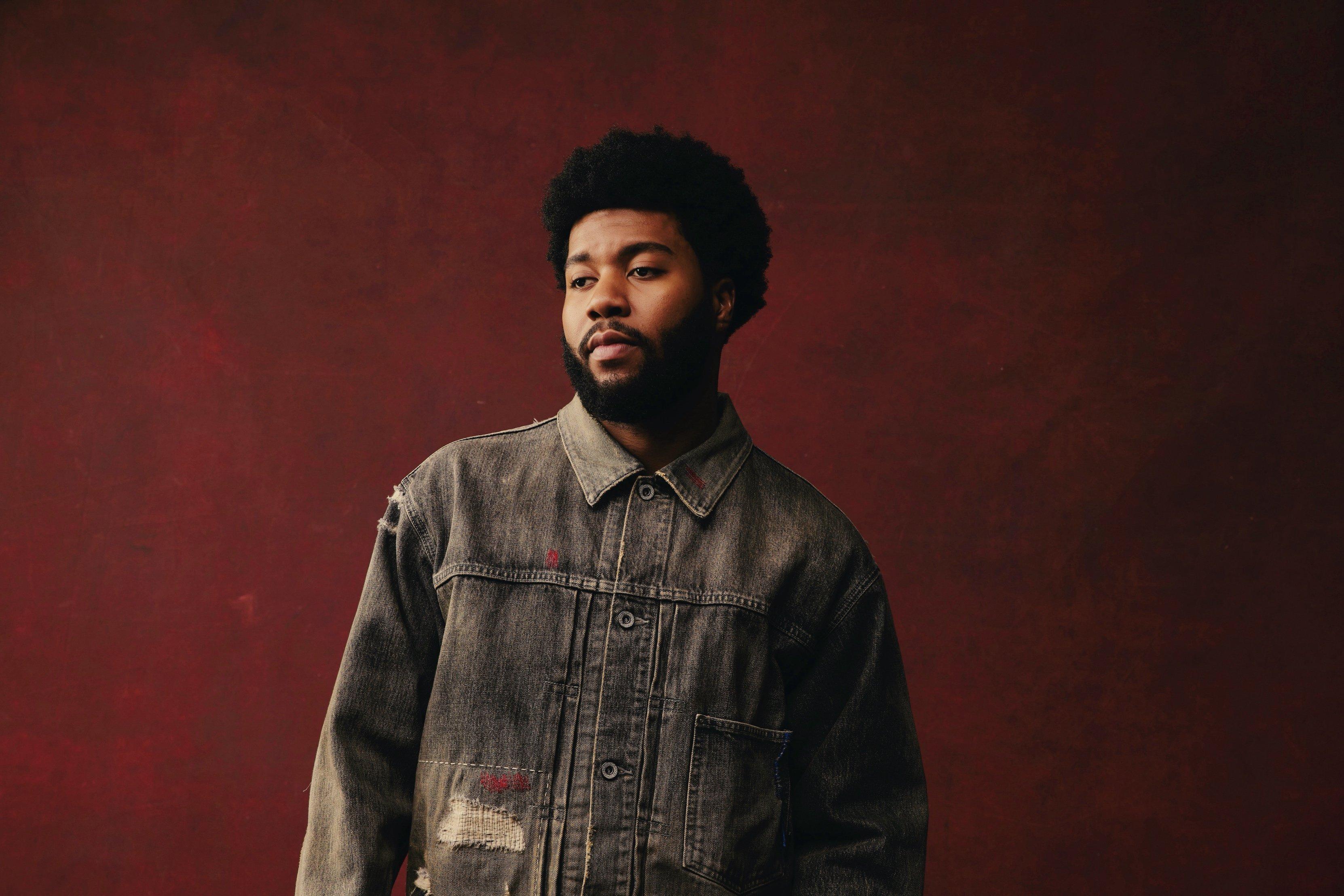
Photo: ro.lexx
news
New Music Friday: Listen To New Songs From Khalid, Mariah Carey, NAYEON, And More
From reworked classics to new fresh tunes, take a listen to some of the most exciting tracks that dropped on June 14.
Those pre-summer Fridays just keep rolling on. With each release day, the music community fills our hard drives, playlists and record shelves with more aural goodness.
Granted, to wrangle it all in one place is impossible — but GRAMMY.com can provide a healthy cross-section of what's out there. From here, venture forth into new releases by Luke Combs (Fathers & Sons), Normani (Dopamine), Moneybagg Yo (Speak Now), Jelly Roll ("I Am Not Okay"), and more.
For now, here are nine new songs or albums to explore.
Khalid — "Adore U"
After previously released single "Please Don't Fall in Love With Me," Khalid is back with another luminous ode to romantic disconnection, where he calls for healing amid broken ties.
"Thousand miles apart and you're still in my heart/ Can we take it back?" Khalid pleads in the hook. "I'm waiting at the start/ Fly me to the moon and now I'm seeing stars when we touch."
Khalid hasn't released a full-length album since 2019's Free Spirit. But he's been teasing a new project for a minute: two weeks ago, he shared an Instagram carousel with the caption "5 years later. Here we go again." And the yearning "Adore U" certainly sets the tone for what's to come in Khalid's world.
NAYEON — 'NA'
TWICE's NAYEON is shifting gears towards her highly anticipated solo comeback with the release of NA, a project that spans pop, dance, and more. The follow-up to her debut solo album, 2022's IM NAYEON, NA provides a glimpse into the TWICE member's transition from being daunted by a solo career to finding comfort in the act.
One highlight is the shimmering "Butterflies," which NAYEON described to Rolling Stone as "one of my favorite songs" yet "one of the harder ones to record, actually." Another is the brassy "Magic," which she calls "a very self-confident song." All in all, NA winningly cements NAYEON's identity — irrespective of her main gig.
Mariah Carey — 'Rainbow: 25th Anniversary Extended Edition'
In light of its 25-year anniversary, Mariah Carey revisits her iconic 1999 album, Rainbow, which featured collaborations with fellow household names like Jay-Z, USHER, and Missy Elliott. The new anniversary edition boasts a plethora of remastered and remixed tracks — a treasure trove for Carey acolytes.
One new track is "Rainbow's End," produced by David Morales; Carey described it as "a hopeful ending to an emotional roller-coaster ride." Elsewhere, there's "There For Me," a love letter to her fans that didn't make the album; a new remix of "How Much" by Jermaine Dupri, and some intriguing live recordings and a cappella tracks.
$UICIDEBOY$ — 'New World Depression'
Since at least their debut album, 2018's I Want to Die in New Orleans, rap duo $UICIDEBOY$ have expertly cataloged the bugs beneath the rock of the human experience: addiction, depression, the whole nine yards. New World Depression is a further distillation of their beautifully filthy aesthetic and worldview.
In highlights like "Misery in Waking Hours" and "Transgressions," MCs $crim and Ruby da Cherry's chroniclings of misery are barer than ever: "Hurts too much to give a f— / Demoralized, always lying, telling people I'll be fine," they rap. Who hasn't felt like this, at one point or another?
John Cale — 'POPtical Illusion'
At 82, Velvet Underground violist, multi-instrumentalist and co-founder John Cale is still a tinkerer, a ponderer, an artist in flux rather than stasis. In 2023, when GRAMMY.com asked when he felt he came into his own as an improviser, he immediately replied "Last year."
That interview was centered around that year's solo album, Mercy, another gem in a solo discography full of them. Now, he's already back with a follow-up, POPtical Illusion.
While POPtical Illusion maintains its predecessors' foreboding, topical nature — and then some — tracks like "Laughing in My Sleep" and "Funkball the Brewster" couch these morose topics in a more playful, irreverent aural palette.
Tanner Adell — "Too Easy"
The Twisters soundtrack continues to be a whirlwind of great tunes. The latest dispatch is Tanner Adell's "Too Easy," a country-pop dance floor banger — its video even featuring a performance by dance troupe the PBR Nashville Buckle Bunnies.
"Too Easy" is the fourth song to be released from the Twisters soundtrack, following Tucker Wetmore's "Already Had It," Megan Moroney's "Never Left Me," Bailey Zimmerman's "Hell or High Water," and Luke Combs' "Ain't No Love in Oklahoma." The full album — which features a hoard of country stars, including Lainey Wilson, Thomas Rhett, Tyler Childers and more — will be available on July 19 when the movie hits theaters.
Stonebwoy — "Your Body"
We've clearly caught Ghanian Afropop star Stonebwoy in a jubilant mood. In a teaser for his new song, "Your Body," the singer born Livingstone Satekia undulates on a saturated, red-and-blue backdrop, foreshadowing the sticky summer days we'll spend jamming the tune.
And the full song certainly doesn't disappoint. Interweaving strains of pop, R&B and reggae, with Stonebwoy deftly switching between singing and rapping, "Your Body" will get your body moving.
Toosii — "Where You Been"
Rapper Toosii last teased his upcoming eighth mixtape, JADED, with "Suffice," its lead single released back in November. In the interim, he's been "locked in perfecting a new look a new sound new everything!" as he shared in an Instagram reel. "I just hope you're ready," he added with star and smile emojis.
Said teaser pointed toward a melancholic, weighty ballad, which ended up being the next release from JADED, "Where You Been." Riding a multidimensional, brain-flipping beat, the song is an immersive, thoughtful banger not to be missed.
Victoria Monét — "Power of Two" (from 'The Acolyte')
The latest Star Wars show on Disney+, "The Acolyte," is getting rave reviews — and three-time GRAMMY winner Victoria Monét is now part of its musical universe. She's contributed an original song, "Power of Two," to the end credits of the Lucasfilm series.
Over an ethereal, melancholic beat, the lyrics detail emotions ripe for either terra firma or a galaxy far, far away: "You thought your soul was a necklace/ That you could wear and take off/ That you could rip and break off/ That you could trade in the dark/ But you're mine."
Bring these killer tunes straight into your weekend — and keep checking GRAMMY.com for more brand-new New Music Friday lists!

Photo: Jathan Campbell
list
How Much Is A GRAMMY Worth? 7 Facts To Know About The GRAMMY Award Trophy
Here are seven facts to know about the actual cost and worth of a GRAMMY trophy, presented once a year by the Recording Academy at the GRAMMY Awards.
Since 1959, the GRAMMY Award has been music’s most coveted honor. Each year at the annual GRAMMY Awards, GRAMMY-winning and -nominated artists are recognized for their musical excellence by their peers. Their lives are forever changed — so are their career trajectories. And when you have questions about the GRAMMYs, we have answers.
Here are seven facts to know about the value of the GRAMMY trophy.
How Much Does A GRAMMY Trophy Cost To Make?
The cost to produce a GRAMMY Award trophy, including labor and materials, is nearly $800. Bob Graves, who cast the original GRAMMY mold inside his garage in 1958, passed on his legacy to John Billings, his neighbor, in 1983. Billings, also known as "The GRAMMY Man," designed the current model in use, which debuted in 1991.
How Long Does It Take To Make A GRAMMY Trophy?
Billings and his crew work on making GRAMMY trophies throughout the year. Each GRAMMY is handmade, and each GRAMMY Award trophy takes 15 hours to produce.
Where Are The GRAMMY Trophies Made?
While Los Angeles is the headquarters of the Recording Academy and the GRAMMYs, and regularly the home of the annual GRAMMY Awards, GRAMMY trophies are produced at Billings Artworks in Ridgway, Colorado, about 800 miles away from L.A.
Is The GRAMMY Award Made Of Real Gold?
GRAMMY Awards are made of a trademarked alloy called "Grammium" — a secret zinc alloy — and are plated with 24-karat gold.
How Many GRAMMY Trophies Are Made Per Year?
Approximately 600-800 GRAMMY Award trophies are produced per year. This includes both GRAMMY Awards and Latin GRAMMY Awards for the two Academies; the number of GRAMMYs manufactured each year always depends on the number of winners and Categories we award across both award shows.
Fun fact: The two GRAMMY trophies have different-colored bases. The GRAMMY Award has a black base, while the Latin GRAMMY Award has a burgundy base.
Photos: Gabriel Bouys/AFP via Getty Images; Frederick M. Brown/Getty Images
How Much Does A GRAMMY Weigh?
The GRAMMY trophy weighs approximately 5 pounds. The trophy's height is 9-and-a-half inches. The trophy's width is nearly 6 inches by 6 inches.
What Is The True Value Of A GRAMMY?
Winning a GRAMMY, and even just being nominated for a GRAMMY, has an immeasurable positive impact on the nominated and winning artists. It opens up new career avenues, builds global awareness of artists, and ultimately solidifies a creator’s place in history. Since the GRAMMY Award is the only peer-voted award in music, this means artists are recognized, awarded and celebrated by those in their fields and industries, ultimately making the value of a GRAMMY truly priceless and immeasurable.
In an interview featured in the 2024 GRAMMYs program book, two-time GRAMMY winner Lauren Daigle spoke of the value and impact of a GRAMMY Award. "Time has passed since I got my [first] GRAMMYs, but the rooms that I am now able to sit in, with some of the most incredible writers, producers and performers on the planet, is truly the greatest gift of all."
"Once you have that credential, it's a different certification. It definitely holds weight," two-time GRAMMY winner Tariq "Black Thought" Trotter of the Roots added. "It's a huge stamp as far as branding, businesswise, achievement-wise and in every regard. What the GRAMMY means to people, fans and artists is ever-evolving."
As Billboard explains, artists will often see significant boosts in album sales and streaming numbers after winning a GRAMMY or performing on the GRAMMY stage. This is known as the "GRAMMY Effect," an industry phenomenon in which a GRAMMY accolade directly influences the music biz and the wider popular culture.
For new artists in particular, the "GRAMMY Effect" has immensely helped rising creators reach new professional heights. Samara Joy, who won the GRAMMY for Best New Artist at the 2023 GRAMMYs, saw a 989% boost in sales and a 670% increase in on-demand streams for her album Linger Awhile, which won the GRAMMY for Best Jazz Vocal Album that same night. H.E.R., a former Best New Artist nominee, saw a massive 6,771% increase in song sales for her hit “I Can’t Breathe” on the day it won the GRAMMY for Song Of The Year at the 2021 GRAMMYs, compared to the day before, Rolling Stone reports.
Throughout the decades, past Best New Artist winners have continued to dominate the music industry and charts since taking home the GRAMMY gold — and continue to do so to this day. Recently, Best New Artist winners dominated the music industry and charts in 2023: Billie Eilish (2020 winner) sold 2 million equivalent album units, Olivia Rodrigo (2022 winner) sold 2.1 million equivalent album units, and Adele (2009 winner) sold 1.3 million equivalent album units. Elsewhere, past Best New Artist winners have gone on to star in major Hollywood blockbusters (Dua Lipa); headline arena tours and sign major brand deals (Megan Thee Stallion); become LGBTIA+ icons (Sam Smith); and reach multiplatinum status (John Legend).
Most recently, several winners, nominees and performers at the 2024 GRAMMYs saw significant bumps in U.S. streams and sales: Tracy Chapman's classic, GRAMMY-winning single "Fast Car," which she performed alongside Luke Combs, returned to the Billboard Hot 100 chart for the first time since 1988, when the song was originally released, according to Billboard. Fellow icon Joni Mitchell saw her ‘60s classic “Both Sides, Now,” hit the top 10 on the Digital Song Sales chart, Billboard reports.
In addition to financial gains, artists also experience significant professional wins as a result of their GRAMMY accolades. For instance, after she won the GRAMMY for Best Reggae Album for Rapture at the 2020 GRAMMYs, Koffee signed a U.S. record deal; after his first GRAMMYs in 2014, Kendrick Lamar saw a 349% increase in his Instagram following, Billboard reports.
Visit our interactive GRAMMY Awards Journey page to learn more about the GRAMMY Awards and the voting process behind the annual ceremony.
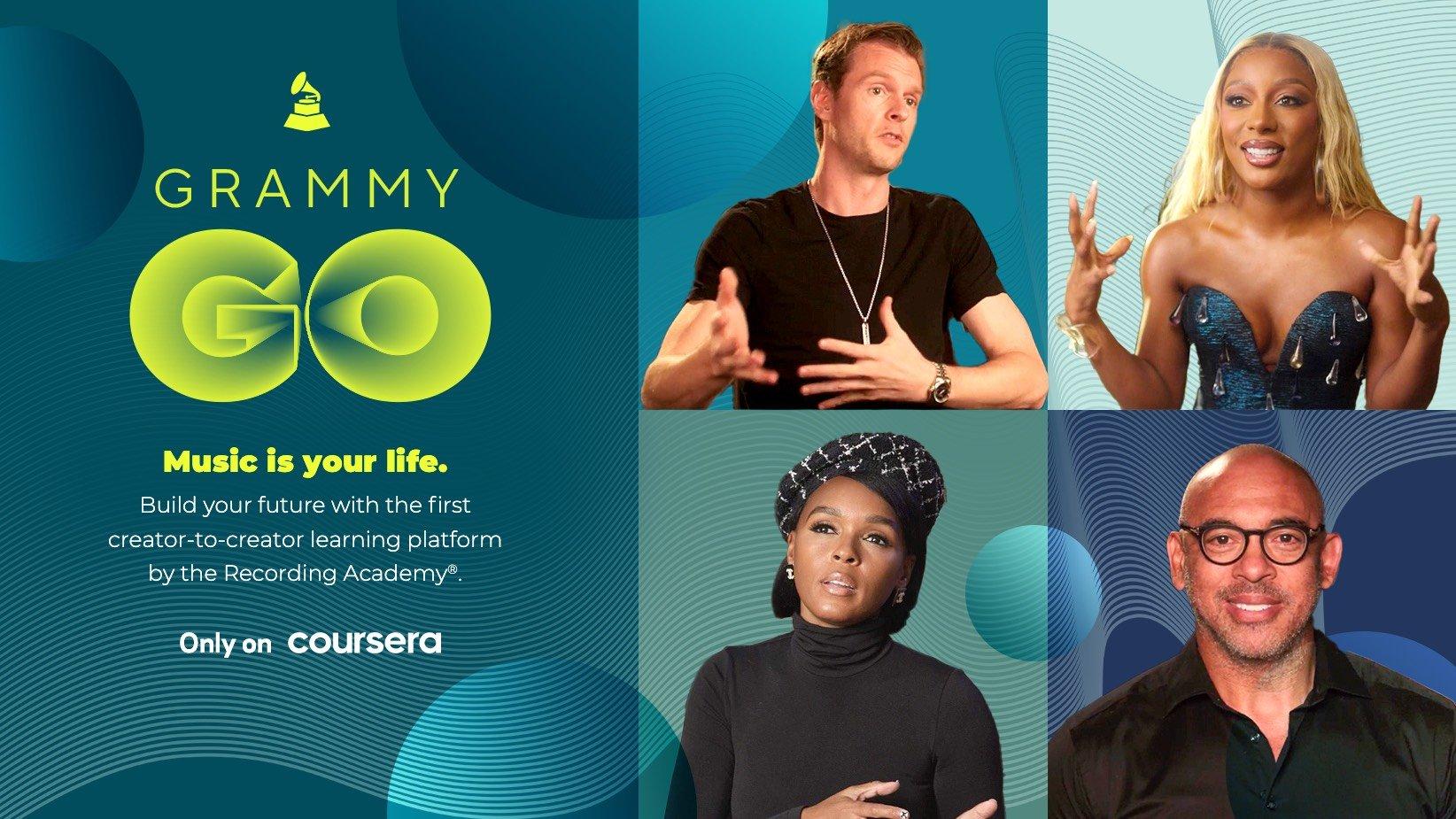
Graphic & Photos Courtesy of GRAMMY GO
news
Recording Academy & Coursera Partner To Launch GRAMMY GO Online Learning Initiative
Class is in session. As part of the Recording Academy's ongoing mission to empower music's next generation, GRAMMY Go offers digital content in specializations geared to help music industry professionals grow at every stage of their career.
The Recording Academy has partnered with leading online learning platform Coursera on GRAMMY GO, a new online initiative to offer classes tailored for music creators and industry professionals.
This partnership empowers the next generation of the music community with practical, up-to-the moment digital content that provides wisdom for both emerging and established members of the industry. Continuing the Academy’s ongoing mission to serve all music people, courses cover a variety of specializations tailored to creative and professional growth.
GRAMMY GO on Coursera includes courses taught by Recording Academy members, featuring GRAMMY winners and nominees and offers real-life lessons learners can put to work right away.
Starting today, enrollment is open for GRAMMY GO’s first Coursera specialization, "Building Your Audience for Music Professionals," taught by Joey Harris, international music/marketing executive and CEO of Joey Harris Inc. The course features Rock & Roll Hall of Fame inductee and five-time GRAMMY winner Jimmy Jam, 10-time GRAMMY nominee Janelle Monáe and three-time GRAMMY winner and the 2024 GRAMMYs Best New Artist Victoria Monét. This foundational specialization will help participants gain the skills, knowledge and confidence to build a strong brand presence and cultivate a devoted audience within the ever-changing music industry.
The partnership’s second course, launching later this summer, aims to strengthen the technological and audio skills of a music producer. "Music Production: Crafting An Award-Worthy Song" will be taught by Carolyn Malachi, Howard University professor and GRAMMY nominee, and will include appearances by GRAMMY winner CIRKUT, three-time GRAMMY winner Hit-Boy, artist and celebrity vocal coach Stevie Mackey, five-time GRAMMY nominee and Recording Academy CEO Harvey Mason jr., and 15-time GRAMMY winner Judith Sherman. Pre-enrollment for "Music Production: Crafting An Award-Worthy Song" opens today.
"Whether it be through a GRAMMY Museum program, GRAMMY Camp or GRAMMY U, the GRAMMY organization is committed to helping music creators flourish, and the Recording Academy is proud to introduce our newest learning platform, GRAMMY GO, in partnership with Coursera," said Panos A. Panay, President of the Recording Academy. "A creator’s growth path is ongoing and these courses have been crafted to provide learners with the essential tools to grow in their professional and creative journeys."
"We are honored to welcome GRAMMY GO, our first entertainment partner, to the Coursera community," said Marni Baker Stein, Chief Content Officer at Coursera. "With these self-paced online specializations, aspiring music professionals all over the world have an incredible opportunity to learn directly from iconic artists and industry experts. Together with GRAMMY GO, we can empower tomorrow's pioneers of the music industry to explore their passion today."
GRAMMY GO also serves as the music community’s newest digital hub for career pathways and editorial content that provides industry insights for members of the industry; visit go.grammy.com for more. For information and enrollment, please visit the landing pages for "Building Your Audience for Music Professionals" and "Music Production: Crafting An Award-Worthy Song."
